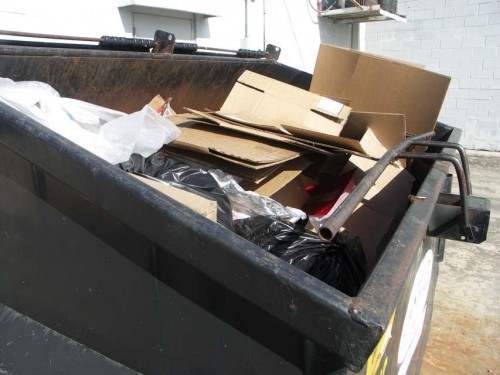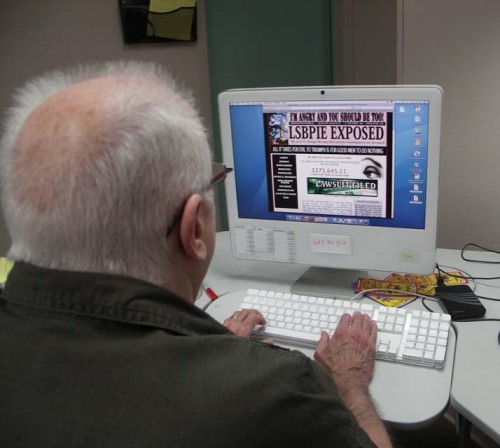
Scams spoil charitable giving
December 1, 2011
Area environment prompts holiday alternatives
December 5, 2011Most professionals that provide services to the public come with associations that police their activity and provide them with a reference point of both accountability and credibility with consumers.
The business of private investigations in Louisiana is among those that rely on licensing, training, referencing and standards through the State Board of Private Investigator Examiners.
With approximately 1,400 license and fee-paying members, LSBPIE Executive Director Pat Englade said the professional agency takes a serious role in policing licensed private investigators to ensure they are conducting business in accordance to law and ethical standards.
“We had a healthy year [in terms of active membership] because of the BP [claims and settlements], Englade said. “It is one of the better years we have had. We actually did better this year than a number of years with licensing. The BP claims were a contributing factor.”
Added revenue to the LSBPIE provided increased cash flow for operating expenses in 2011. It also offered the association approximately $375,000 in reserves through total deposits that some if its members claim is being illegally held in a bank account rather than being turned over to the state treasurer for use in general funds.
Houma based licensed private investigator George Day, along with Robert Weltz and Steve Devine have issued complaints with LSBPIE.
“There is a state law that says you are suppose to turn this money in every year to the state treasury [and] file a budget with them and they will give you money,” day said. “Then if you need additional funds you do like any other state office and go back and get it approved.”
Day made reference to Private Investigators Law 3523, which he said applied specifically to LSBPIE.
Day claimed that LSBPIE has had an ongoing reserve bank account and never turned in funds to the state treasurer. “They got it in private accounts and investment accounts,” he said. “The state is saying they don’t have any money to operate the state on, but they got all these boards setting out there with all this money sitting in these accounts. Maybe this is why they don’t have any money. This is an example.”
Day estimated that there are 1,500 state boards in Louisiana, and suggested that if each had a reserve account of $250,000 the state could use those resources to fight a budget shortfall.
The private investigator referred to Private Investigator Law Statute 3523 and its connection to Article VII, Section 9(A) of the Louisiana Constitution. The statute text reads that: “Subject to the exemption … all fees and funds collected by the board from every source shall be paid to the state treasury and shall be credited to the Bond Security and Redemption Fund.”
“If [LSBPIE] doesn’t use the money in a certain prescribed period of time it goes into the general fund and they can do whatever they want to with the money,” Day said.
State law goes on to specify that after a sufficient amount is allocated form the Bond Security and Redemption Fund to pay all obligations in a fiscal year, the treasurer shall, prior to placing funds in the state general fund, pay into a special fund for the LSBPIE in an amount equal to the total funds the board had paid into the treasury.
Exemptions to Article VII, Section 9(A) include:
- The result of grants or donations or other forms of assistance when the terms and conditions thereof or of agreements pertaining thereto require otherwise;
- Trade or professional associations;
- The employment a security administration fund or its successor;
- Retirement system funds;
- State agencies operating under authority of this constitution preponderantly from fees and charges for the shipment of goods in international maritime trade and commerce;
- State boards, agencies, or commissions, but pledged by it in connection with the issuance of revenue bonds as provided in Paragraph (C) of Section 6 of this Article, other than any surplus as may be defined in the law authorizing such revenue bonds.
“We are exempt from [Article VII, Section 9(A) of the Louisiana Constitution],” Englade said. “If you go to the state law it gives exemptions to certain professional agencies in terms of turning over excess funds to the state treasurer.”
Article VII, Section 9(A)2 specifies that funds generated by trade or professional organizations are exempt from owing balances to the state.
Englade explained that the LSBPIE is funded solely by membership fees with no state funding appropriated to it. “We are what you call a paper agency,” he said. “We are audited by the state legislative auditor. If the auditor had a problem I’m sure they would have brought it up. [We] exist only by the renewals that are paid in here every year and those [funds] go for salaries, legal fees and everything.”
Day specified that during the administration of then Gov. Edwin Edwards the LSBPIE was designated as not being a budget unit and is not required to deposit its revenue into the state treasury or receive an appropriation.
“This would be like me being a state trooper and telling you it is not against the law to drive drunk because I say it ain’t,” Day said. He also accused many of the current board members of being involved in past scandals. Day said that the Louisiana Attorney General’s office has provided the LSBPIE with staff lawyers to represent the board on day-to-day operations. The claim could not be confirmed, but Day and his associates claim a conflict of interest is involved. “How could you file a complaint with the Attorney General’s office against the board when it is providing the board with attorneys who are employees of the Attorney General’s office?”
Day also accused the board of denying public records to those complying with the Public Records Request Act.
“This board is out of control and major changes need to be made in the next [legislative] session,” Day said.
Englade referred to Day and other dissatisfied private investigators as “board watchers” who have scrutinized the LSBPIE board and are looking for shortcomings to attack.
“They have been dissatisfied with this board for years and years and years,” Englade said. “They look at things they think the board is doing improperly. There is a reason we do everything. We are guided by state law and audited every year. If there are any discrepancies at all the legislative auditor will absolutely come and tell me what I’m doing wrong.”
Englade said that on the surface $375, 000 in reserves sounds like a lot of money, but that defending one lawsuit could easily deplete that resource. “It doesn’t take but one court case and you know how much attorneys cost,” he said. “That could be gone in the blink of an eye. You got to have enough money in your account [to cover expenses.] I can’t guarantee that the same number of people will be here next year to be licensed. I may take a $100,000 hit next year. Then what am I supposed to do?”
“Our board has gotten the impression that they can do whatever they want to do,” Day said. “We are trying to get the board changed and let us be controlled by the Secretary of State.”
Day said he has approached legislators for support in addressing claims against the LSBPIE. “Now get this,” he said, “My legislators from around here have not even responded to email. I don’t know that they even got them.”
The LSBPIE board was initiated in 1992 and according to both Day and Englade has been involved in arguments with some of its membership for most of the past 19 years.
Forced to conceal his identity for professional anonymity, George Day and other licensed private investigators are letting their voices be heard as they police the state agency that is designed to keep an eye on their services. MIKE NIXON










